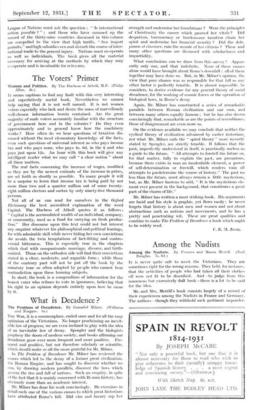What is Decadence ?
THE War, it is a commonplace, ended once and for all the easy optimism of the Victorians. No longer proclaiming an inevit- able law of progress, we are even inclined to play with the idea of an inevitable law of decay. Spengler and the biologists Prophesy the doom of modern society, and books affirming our decadence grow ever more frequent and more positive. Fre- quent and positive, but not therefore scholarly or scientific, which should make us all the more grateful for Mr. Milner.
In The Problem of Decadence Mr. Milner has reviewed the causes which led to the decay of a former great civilization, the Roman Empire, and has sought to discover whether we can, by drawing modern parallels, discover the laws which govern the rise and fall of nations. Such an enquiry, in spite of the fact that it is mainly concerned with Rcman history, has obviously more than an academic interest.
Mr. Milner has done his work convincingly. He examines in detail each one of the various causes to which great historians have attributed Rome's fall. Did vice and luxury sap her strength and undermine her foundations ? Were the principles of Christianity the cancer which gnawed her vitals ? Did despotism, bureaucracy or burdensome taxation chain her spirit and undermine her financial security ? Did the dole, panem et circenses, ruin the morale of her citizens ? These and many other questions are discussed with scholarliness and impartiality.
What conclusions can we draw from this survey ? Appar- ently only one, and that indefinite. None of these causes alone would have brought about Rome's downfall : all of them together may have done so. But, in Mr. Milner's opinion, the view that pure chance was as responsible for that fall as any other factor is perfectly tenable. It is almost impossible, he considers, to derive evidence for any general theory of social decadence, for the working of cosmic forces or the operation of biological laws, in Rome's decay Again, Mr. Milner has constructed a series of remarkable parallels between Roman civilization and our own, and between many others equally famous ; but he has also shown convincingly that, remarkable as are the points of resemblance, those of disagreement are even more so.
On the evidence available we may conclude that neither the cyclical theory of civilization advanced by earlier historians, nor what Mr. Milner calls the spiral theory " more recently stated by Spengler, are strictly tenable. It follows that the past, imperfectly understood in itself, is practically useless as a guide to the future. " All attempts to foretell the future or, for that matter, fully to explain the past, are precarious, because there exists in man an incalculable element, a power of self-determination or freewill, which renders vain all attempts to predetermine the course of history." The past no less than the future, must always remain a little mysterious, but, as Mr. Milner hastens to add, " It is the mysterious ele- ment ever present in the background, that constitutes a great part of the charm of life."
Mr. Milner has written a most striking book. His arguments are lucid and his style is graphic, yet flows easily : he never forgets that history is about men and women and not about abstractions such as nations and movements, and he has a pretty and penetrating wit. These are great qualities and combine to make The Problem of Decadence a book which ought to be widely read. C. E. M. JOAD.






























 Previous page
Previous page